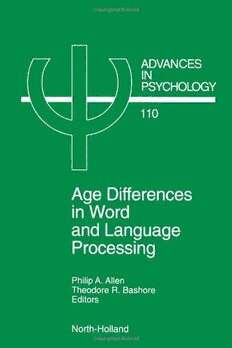Download Age Differences in Word and Language Processing PDF Free - Full Version
Download Age Differences in Word and Language Processing by Philip A. Allen and Theodore R. Bashore (Eds.) in PDF format completely FREE. No registration required, no payment needed. Get instant access to this valuable resource on PDFdrive.to!
About Age Differences in Word and Language Processing
Component cognitive processes have played a critical role in the development of experimental aging research and theory in psychology as attested by articles published on this theme. However, in the last five to ten years, there has been a substantial increase in the number of articles attempting to isolate a single factor (or small subset of factors) responsible for age differences in information processing. This view of aging is frequently termed the complexity model of the generalized slowing model, the primary assumption being that age differences in cognition are due simply to a relatively larger performance decrement on the part of older adults (compared to younger adults) as task complexity increases. Because generalized complexity theorists have questioned the utility of using component cognitive processes as theoretical constructs, the editors feel it is time to restate why component cognitive processes are critical to any thorough understanding of age differences in cognition. Thus the present edited volume represents an attempt to demonstrate the utility of the process-specific approach to cognitive aging. Central to this effort are illustrations of how regression analyses may provide evidence for general slowing by maximizing explained variance while at the same time obscuring local sources of variance.The book concentrates on age differences in word and language processing, because these factors relate to reading which is a critical cognitive process used in everyday life. Furthermore, age differences in word and language processing illustrate the importance of taking component cognitive processes into consideration. The breadth of coverage of the book attests to the wide range of cognitive processes involved in word and language processing.
Detailed Information
| Author: | Philip A. Allen and Theodore R. Bashore (Eds.) |
|---|---|
| Publication Year: | 1995 |
| Pages: | 456 |
| Language: | |
| File Size: | 29.537 |
| Format: | |
| Price: | FREE |
Safe & Secure Download - No registration required
Why Choose PDFdrive for Your Free Age Differences in Word and Language Processing Download?
- 100% Free: No hidden fees or subscriptions required for one book every day.
- No Registration: Immediate access is available without creating accounts for one book every day.
- Safe and Secure: Clean downloads without malware or viruses
- Multiple Formats: PDF, MOBI, Mpub,... optimized for all devices
- Educational Resource: Supporting knowledge sharing and learning
Frequently Asked Questions
Is it really free to download Age Differences in Word and Language Processing PDF?
Yes, on https://PDFdrive.to you can download Age Differences in Word and Language Processing by Philip A. Allen and Theodore R. Bashore (Eds.) completely free. We don't require any payment, subscription, or registration to access this PDF file. For 3 books every day.
How can I read Age Differences in Word and Language Processing on my mobile device?
After downloading Age Differences in Word and Language Processing PDF, you can open it with any PDF reader app on your phone or tablet. We recommend using Adobe Acrobat Reader, Apple Books, or Google Play Books for the best reading experience.
Is this the full version of Age Differences in Word and Language Processing?
Yes, this is the complete PDF version of Age Differences in Word and Language Processing by Philip A. Allen and Theodore R. Bashore (Eds.). You will be able to read the entire content as in the printed version without missing any pages.
Is it legal to download Age Differences in Word and Language Processing PDF for free?
https://PDFdrive.to provides links to free educational resources available online. We do not store any files on our servers. Please be aware of copyright laws in your country before downloading.
The materials shared are intended for research, educational, and personal use in accordance with fair use principles.

